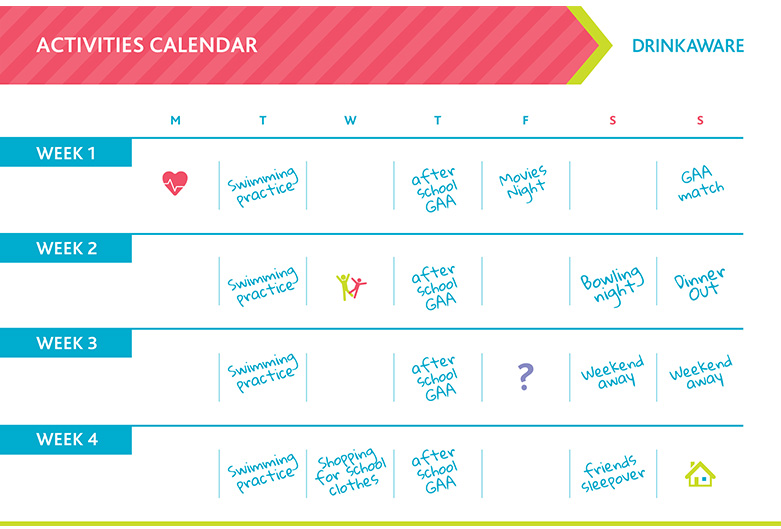Activities
-
Plan Activities
-
Building Resilience
ACTIVITIES CALENDAR
A great way to build resilience in your child is to create opportunities for them to be involved and feel a sense of belonging.
Encourage sports, hobbies and social activities that keep your child active, healthy and fulfilled. Boredom and having nothing to do is often stated as a reason why some teenagers start drinking. So why not help your child
get involved in activities that are of interest to them?

Building Resilience
Resilience is the ability to bounce back from adversity. Research suggests that young people lacking resilience are more likely to engage in unhealthy or risky behaviours than those who don’t. Children can feel overwhelmed by different things going on in their lives between family life, peer groups and school life. Having certain resiliency skills and characteristics minimises the effect that negative, stressful situations can have on a young person. How can you build resilience in your children? Parents are the most important people to help build their children’s resilience and this requires consistent effort. If we want our young people to cope, solve problems or look after themselves, we need to provide them with opportunities to use these skills in areas that mean something to them. Here are just some of the ways you can build resilience in your children. (1)
-
Be caring and supportive
Caring is probably the most important tool for building resilience. Every young person should have several adults that they can turn to and know that they care. Encourage an open dialogue and remind your children that they can share their problems with you or another trusted adult without judgement.
-
Expect good things from young people
Without putting additional pressure on young people, having high expectations for them supports success. Your expectations and your belief in your child’s ability can motivate your child to fulfil his or her goals. You encourage your child to aim for a goal when you ask about and listen to their thoughts on the future.
-
Create opportunities to be involved
Providing opportunities for your children to be involved and to make a contribution is a powerful protective factor. This can be done in a number of ways – provide them with responsibility around the house or involve them in decision-making processes. Try to encourage their involvement in extracurricular activities or identify opportunities for them to get involved within their communities.
-
Set clear and consistent limits
Consistent rules and expectations for behaviour tell young people what is expected of them. Structures and limits can help them feel secure. Young people need a fundamental sense of right or wrong to ensure they are prepared to make wise choices.
-
Foster a sense of belonging
When young people have a sense of belonging they are less likely to get involved in risky behaviours. It’s important that they feel connected and part of something. Spending time together as a family and doing activities together will reduce the likelihood of your child engaging in risky or anti-social behaviours.
-
Encourage life skills budiling
Help young people develop the skills they need in everyday life such as assertiveness, problem-solving, decision-making and coping. A simple way this can be achieved is through involving them in family decision-making and providing them with responsibilities within the home.
-
Lead by example
Children learn a lot by watching their parents. When parents cope well with every day stress, they are showing their children how to do the same. Encourage your children to develop safe strategies for coping with stress. Be especially conscious of the example you may be setting for your children if you have tendency to drink alcohol to relieve stress.
-
References
(1) All information and advice on this page has been adapted from Sipler, E. (2007) Bouncing Back – Building Resilience in Young People. South Eastern Trust.

